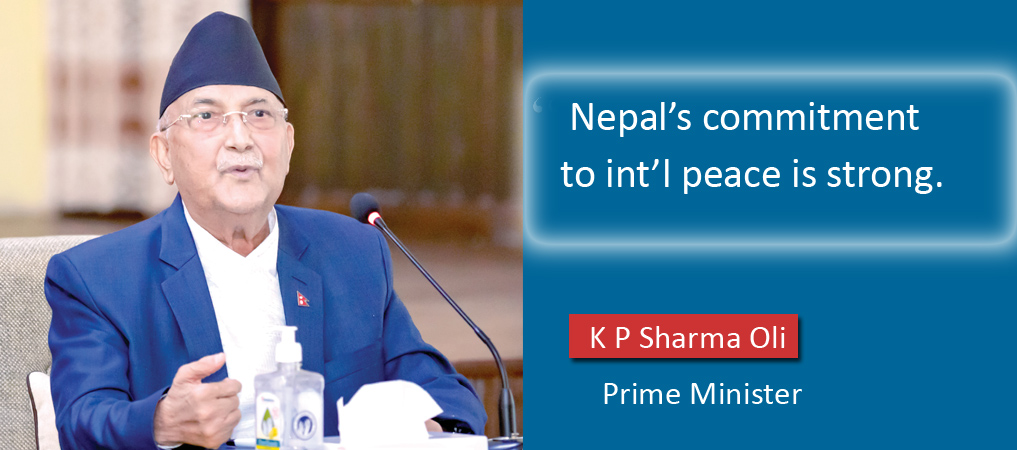World needs masks, not muskets: PM

By A Staff Reporter
Kathmandu, Sept. 26: Prime Minister KP Sharma Oli has said that the world needed more masks, not muskets.
“We need more protective equipment not destructive weapons, and more social spending to save lives not military spending to destroy lives,” he said while addressing the General Debate of the 75th session of the United Nations General Assembly on Friday.
He delivered his message via video conferencing since the COVID-19 had forced the global body to organise the anniversary programmes virtually.
We all know what is more important at present- nuclear weapons or accessible vaccine against COVID-19, he said.
“Even when disarmament related processes, including the Non-Proliferation Treaty Review Conference are postponed due to the pandemic, the concerned parties must continue to fulfill their treaty obligations to make the world safer,” he said, calling for a general and complete disarmament of all weapons of mass destruction. In 2019, the world military expenditure amounted to US dollar 1.9 trillion.
Even a fraction of those resources could bring respite to the millions of people suffering from poverty, hunger, and deprivation, according to Prime Minister Oli.
He said that easy, smooth and affordable access to anti-COVID vaccines after they are developed; sharing of knowledge and experiences; and provision of timely supply of medical equipment and medicines should be given high priority during this crisis.
“Protecting lives of the people both from disease and hunger is the supreme duty of the governments. While we have deployed all our efforts and resources to that end, international solidarity becomes equally important,” he said.
He reiterated the importance of multilateral cooperation in the face of unilateral tendencies and protectionist policies.
According to him, it is unthinkable to talk about degrading the value of multilateralism at a time when its relevancy becomes more pronounced than ever. Larger global good, not the parochial national interest, should underpin multilateralism and the rules-based order. Similarly, Prime Minister Oli said that the current crisis has pushed us to the brink of losing the gains made in achieving the Sustainable Development Goals.
The least Developed Countries, small island nations and landlocked countries are facing limitation of resources, social protection, and requisite health infrastructures, he said. The distress has been further compounded by the halt in tourism, remittances and disruptions on supply chains and trade.
“Poverty is increasing, mostly in developing countries, for the first time in the last 20 years,” Prime Minister Oli said.
He reiterated Nepal’s commitment to international peace and stability and suggested that the troops and police-contributing countries should have greater share of decision-making positions both in headquarters and in the field missions. He also presented the climate crisis as the existential threat and said that the silence of the large emitters should not lead to the failure of responsibilities.
“Nepal’s mountains are not only our assets, but they are of global significance in view of their vital contribution to the maintenance of health of the planet,” he said.
Stating that the global trading system has been pushed into peril, he called for the urgent reform of the World Trade Organisation to ensure level playing field and rebuild trust.
(See Page 3 for full text.)
Recent News

Do not make expressions casting dout on election: EC
14 Apr, 2022
CM Bhatta says may New Year 2079 BS inspire positive thinking
14 Apr, 2022
Three new cases, 44 recoveries in 24 hours
14 Apr, 2022
689 climbers of 84 teams so far acquire permits for climbing various peaks this spring season
14 Apr, 2022
How the rising cost of living crisis is impacting Nepal
14 Apr, 2022
US military confirms an interstellar meteor collided with Earth
14 Apr, 2022
Valneva Covid vaccine approved for use in UK
14 Apr, 2022
Chair Prachanda highlights need of unity among Maoist, Communist forces
14 Apr, 2022
Ranbir Kapoor and Alia Bhatt: Bollywood toasts star couple on wedding
14 Apr, 2022
President Bhandari confers decorations (Photo Feature)
14 Apr, 2022










